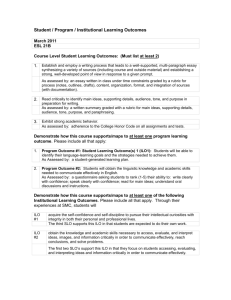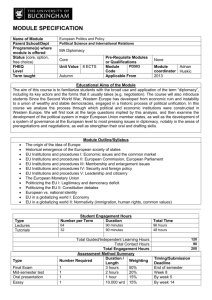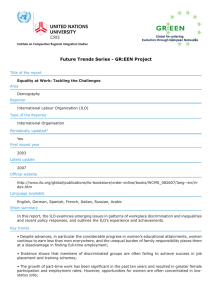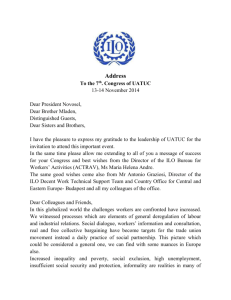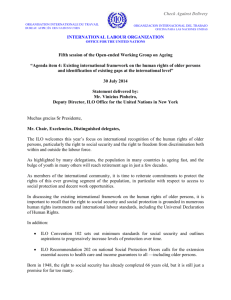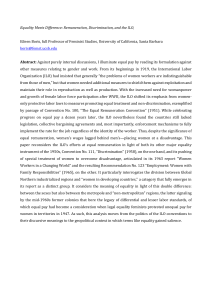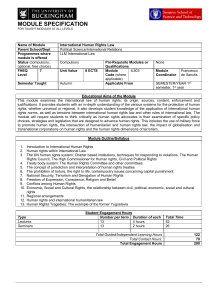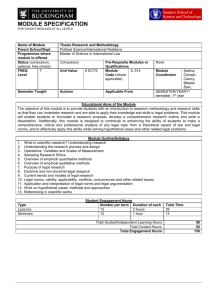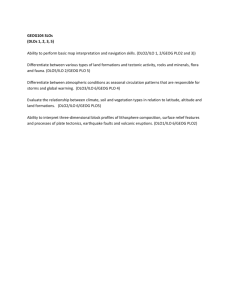(2007). Foreign Policy Analysis
advertisement
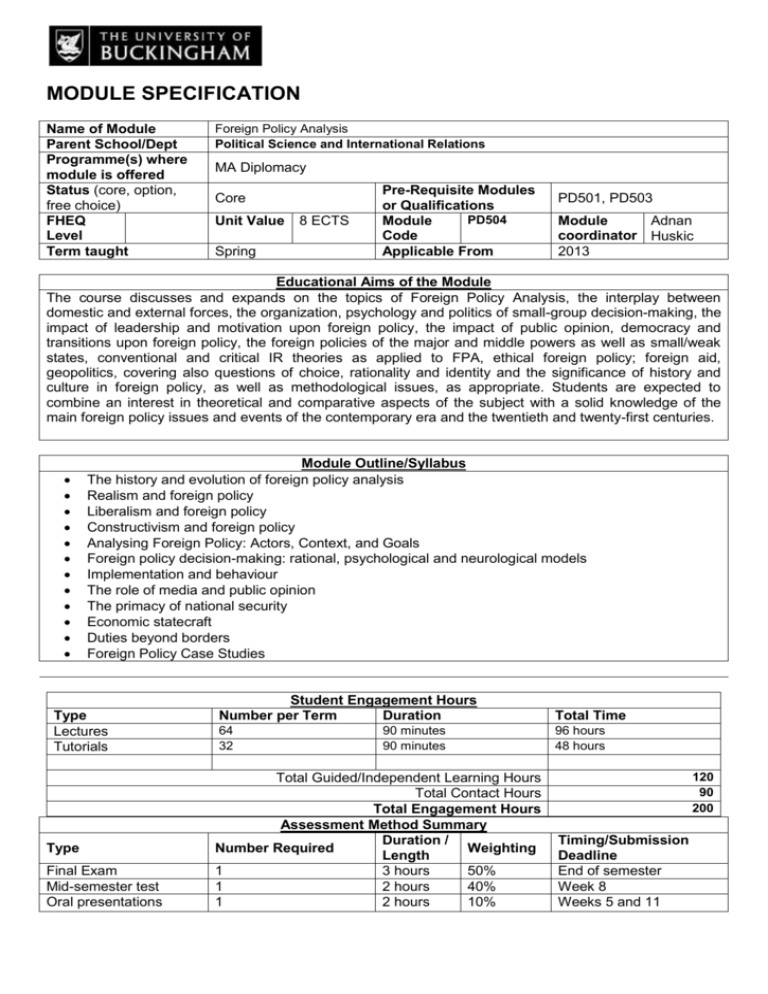
MODULE SPECIFICATION Name of Module Parent School/Dept Programme(s) where module is offered Status (core, option, free choice) FHEQ Level Term taught Foreign Policy Analysis Political Science and International Relations MA Diplomacy Core Unit Value Spring 8 ECTS Pre-Requisite Modules or Qualifications PD504 Module Code Applicable From PD501, PD503 Module Adnan coordinator Huskic 2013 Educational Aims of the Module The course discusses and expands on the topics of Foreign Policy Analysis, the interplay between domestic and external forces, the organization, psychology and politics of small-group decision-making, the impact of leadership and motivation upon foreign policy, the impact of public opinion, democracy and transitions upon foreign policy, the foreign policies of the major and middle powers as well as small/weak states, conventional and critical IR theories as applied to FPA, ethical foreign policy; foreign aid, geopolitics, covering also questions of choice, rationality and identity and the significance of history and culture in foreign policy, as well as methodological issues, as appropriate. Students are expected to combine an interest in theoretical and comparative aspects of the subject with a solid knowledge of the main foreign policy issues and events of the contemporary era and the twentieth and twenty-first centuries. Module Outline/Syllabus The history and evolution of foreign policy analysis Realism and foreign policy Liberalism and foreign policy Constructivism and foreign policy Analysing Foreign Policy: Actors, Context, and Goals Foreign policy decision-making: rational, psychological and neurological models Implementation and behaviour The role of media and public opinion The primacy of national security Economic statecraft Duties beyond borders Foreign Policy Case Studies Type Lectures Tutorials Type Final Exam Mid-semester test Oral presentations Student Engagement Hours Number per Term Duration Total Time 64 32 96 hours 48 hours 90 minutes 90 minutes Total Guided/Independent Learning Hours Total Contact Hours Total Engagement Hours Assessment Method Summary Duration / Number Required Weighting Length 1 3 hours 50% 1 2 hours 40% 1 2 hours 10% 120 90 200 Timing/Submission Deadline End of semester Week 8 Weeks 5 and 11 Intended Learning Outcomes: Module Outcomes Teaching and Learning Strategy: At the end of the Course, students should be able to: 1. Show systematic understanding of the main concepts central to development of foreign policy analysis. 2. Show in-depth comprehension of the process of foreign policy analysis, factors that influence it and theories that shape it. 3. Construct theoretically sound and empirically substantiated analysis on current issues and processes of relevance to foreign policy. 4. Show comprehensive Understanding of the current political phenomena, events and developments. Practical Skills 1. Learn how to analyze current foreign policy moves 2. Public speaking 3. Analytical writing in diplomacy studies → → 1. Course readings and class discussions. (ILO: 1-4) 2. Individual and group presentations and discussions. (ILO: 1-4) 3. Classroom assignments and simulations. (ILO: 1-4) 4. Lectures/presentations Tutorial classes. (ILO: 1-4) Assessment Strategy 1. Course work –class participation, oral presentation and discussion (10%), midterm exam (40%) (ILO: 1-4) 2. Final Exam – 50% (ILO: 1-4) Teaching and Learning Strategy: → 1. Practical with tutor-lead support (PS: 1-3) 2. Individual project assignment (PS: 2) 3. Simulation games (PS: 1,2) Assessment Strategy → 1. Written Exam (PS: 1,3) 2. Individual Project (PS: 2, 3) 3. Essay (PS: 3) Transferable Skills Teaching and Learning Strategy: 1. Critically evaluate ideas, arguments and texts. 2. Research & critically evaluate information. 3. Present effective written argument and presentation. 4. Demonstrate successful multi-perspective analysis of political issues and of engaging with different viewpoints. 5. Critically analyze and interpret political events and phenomena, applying theoretical frameworks in different, new contexts and linking empirical data with theoretical frameworks. 1. Course readings and class discussions. (TS: 1, 2,3,5) 2. Individual and group presentations and discussions (1-5) 3. Classroom assignments and simulations. (TS 1, 3, 5). 4. Written assignments. (TS: 1, 2, 4,5) 5. Individual discussions with students as needed and provide detailed feedback on their writings. (TS: 1, 2, 3, 4, 5) → → Assessment Strategy 1. Course work –class participation, oral presentation and discussion (10%), midterm exam (40%)(TS:1-5) 2. Final Exam – 50% (TS: 1-5) Key Texts and/or other learning materials Hudson, V.M. (2006). Foreign Policy Analysis: Classic and Contemporary Theory. Rowman & Littlefield Publishers, Inc. Smith, S., Hadfield, A., Dunne, T. (2008). Foreign Policy: Theories, Actors, Cases. Oxford University Press, USA. Breuning, M. (2007). Foreign Policy Analysis: A Comparative Introduction. Palgrave Macmillan, 1st edition. Please note: This specification provides a concise summary of the main features of the module and the learning outcomes that a typical student might reasonably be expected to achieve and demonstrate if he/she takes full advantage of the learning opportunities that are provided. More detailed information on the learning outcomes, content and teaching, learning and assessment methods of each module and programme can be found in the departmental or programme handbook. The accuracy of the information contained in this document is reviewed annually by the University of Buckingham and may be checked by the Quality Assurance Agency. Date of Production 26 August 2013 Date approved by School Learning and Teaching Committee Date approved by School Board of Study Date approved by University Learning and Teaching Committee Date of Annual Review

